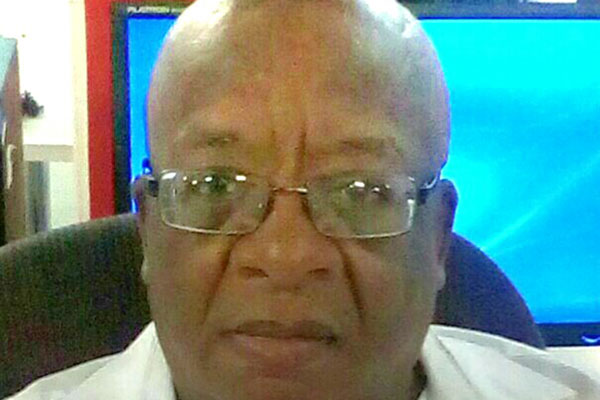
Echoes: CONWAY TUTANI
What does it mean to be a “complete thinker”? Complete thinking entails connecting apparently disparate or unconnected ideas.
To further elaborate, it means being able to take on a variety of ideas and disciplines and put them all together in a way that shows they work together. It means thinking like GK Chesterton (May 29,1874 — June 14,1936), the celebrated English writer, poet, philosopher, dramatist, journalist, orator, lay theologian, biographer, and literary and art critic, who is often referred to as the “prince of paradox” because “he made his points” by “first carefully turning them inside out”.
He had this rare amazing gift for being both funny and profound, Chesterton would have pointed out the dissonance in America’s offer of humanitarian aid to Venezuela while at the same time CNN this week had a report with the headline Venezuelan hospitals struggle under US sanctions.
“So you offer aid for a humanitarian crisis that you yourself have caused in the first place?” the “prince of paradox” would have told US President Donald Trump to make him see the direct causal link between US-imposed sanctions and the economic hardships in Venezuela.
Zimbabwe is also blessed with “princes of paradox”, one of them being Godwin Chireka, who has unpacked with dazzling clarity the toxic debate on the sanctions imposed unilaterally on Zimbabwe by the West: “Why do some people make it sound like one will only be either against sanctions or against corruption? In reality, both are evils of equal measure … we have countries ranked worse than Zimbabwe in terms of corruption, but are doing much better economy-wise. The challenge we have is to think we have to pick sides and show our dislike of Zanu PF by saying sanctions are not hurting us. Truth is sanctions are even making corruption worse.”
Now, that’s a living example of a complete thinker as opposed to compartmentalised thinking. What does it mean to be a “complete thinker”? It needs to be reiterated that it means being able to take on a wide variety of ideas and disciplines and put them all together in a way that shows how they work together or work in tandem. Well, Chireka does that with dazzling clarity.
Zimbabwean singer Leonard Zhakata is another such “prince of paradox”. Zhakata, who personifies modesty in outlook, said last week: “Whatever is going on with me, what I am wearing, or for you to even wear shoes — whether you check Zimbabwe’s records, the country’s literacy rate, or statistics of people who can afford suits — you will see that all of us write and sing politics. But what I am against, I think, is when it gets to where I have to praise this party or that party, or where I have to sell the policies or manifesto of a certain party. You won’t find me in that category of politics. But whatever is good for Zimbabwe, that I sing.”
- Chamisa under fire over US$120K donation
- Mavhunga puts DeMbare into Chibuku quarterfinals
- Pension funds bet on Cabora Bassa oilfields
- Councils defy govt fire tender directive
Keep Reading
That’s really Chestertonian complete thinking with dazzling clarity. That’s intellectual — not emotional — unpacking of it. Whoever said musicians are not cerebral or brainy is wrong. Like the non-degreed former Manchester United Football Club manager Sir Alex Ferguson, who was invited by Harvard University in 2014 to give a lecture on his successful management style, Zhakata could teach some Zimbabwean academics a thing or two about how not to compromise their analysis by avoiding taking sides and further poisoning the situation and worsening polarisation.
American politician, sociologist and diplomat Daniel Patrick Moynihan (March 16,1927 — March 26, 2003), another “prince of paradox”, revealingly observed: “The amount of violations of human rights in a country is always an inverse function of the amount of complaints about human rights violations heard from there. The greater the number of complaints being aired, the better protected are human rights in that country.”
So, people should not take an overly dim view of the human rights situation in Zimbabwe. In fact, the increased transparency and reports shows that things have vastly improved and are still improving, paradoxical as it may sound.
“Thinking,” wrote Chesterton, “means connecting things.” He said ideas are not only connected to each other, they are also connected to us as individuals in society. In a world of increasing specialisation and, as consequence or corollary, polarisation, Chesterton connects us to the big picture by helping us see how the many and varied elements within our experience fit together.
The report compiled by South African Dutch Reformed Church clerics Braam Hanekom and Llewellyn MacMaster (published in the Daily News on February 9, 2019 with the headline Clerics caution Chamisa, CSOs … advise opposition to abandon toxic politics) illustrates with dazzling clarity the importance of complete thinking “because you are dealing with a military situation that actually only knows one form of action”. As has been pointed out before, people ought to know what they are doing before foolhardily making a bad situation much worse.
After a fact-finding mission, the clerics advised: “Assurance that the International Criminal Court will not strike out at senior government officials is important … Otherwise a ‘fight to the end’ scenario is definitely on the table. Traditional opposition politics will not work now … What is urgently required is influence by people who do not necessarily want to overthrow a government, but are level-headed and looking to create a win-win situation.”
Like Chesterton, the clerics, as complete thinkers — not compartmentalised thinkers — made their points by first carefully turning them inside out to give the complete picture that toxic politics is not the way forward, but the way backward.
Indeed, what’s needed are complete thinkers, not compartmentalised thinking.
Conway Nkumbuzo Tutani is a Harare-based columnist. Email: [email protected]











